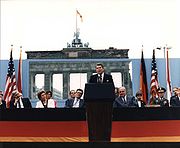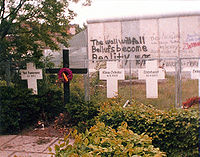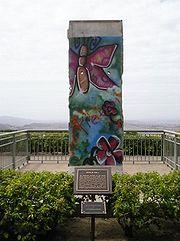
Tear down this wall
Encyclopedia

President of the United States
The President of the United States of America is the head of state and head of government of the United States. The president leads the executive branch of the federal government and is the commander-in-chief of the United States Armed Forces....
Ronald Reagan
Ronald Reagan
Ronald Wilson Reagan was the 40th President of the United States , the 33rd Governor of California and, prior to that, a radio, film and television actor....
to Soviet
Soviet Union
The Soviet Union , officially the Union of Soviet Socialist Republics , was a constitutionally socialist state that existed in Eurasia between 1922 and 1991....
leader Mikhail Gorbachev
Mikhail Gorbachev
Mikhail Sergeyevich Gorbachev is a former Soviet statesman, having served as General Secretary of the Communist Party of the Soviet Union from 1985 until 1991, and as the last head of state of the USSR, having served from 1988 until its dissolution in 1991...
to destroy the Berlin Wall
Berlin Wall
The Berlin Wall was a barrier constructed by the German Democratic Republic starting on 13 August 1961, that completely cut off West Berlin from surrounding East Germany and from East Berlin...
.
In a speech at the Brandenburg Gate
Brandenburg Gate
The Brandenburg Gate is a former city gate and one of the most well-known landmarks of Berlin and Germany. It is located west of the city centre at the junction of Unter den Linden and Ebertstraße, immediately west of the Pariser Platz. It is the only remaining gate of a series through which...
near the Berlin Wall
Berlin Wall
The Berlin Wall was a barrier constructed by the German Democratic Republic starting on 13 August 1961, that completely cut off West Berlin from surrounding East Germany and from East Berlin...
on June 12, 1987, commemorating the 750th anniversary of Berlin
Berlin
Berlin is the capital city of Germany and is one of the 16 states of Germany. With a population of 3.45 million people, Berlin is Germany's largest city. It is the second most populous city proper and the seventh most populous urban area in the European Union...
, Reagan challenged Gorbachev (who was then the General Secretary
General Secretary of the Communist Party of the Soviet Union
General Secretary of the Central Committee of the Communist Party of the Soviet Union was the title given to the leader of the Communist Party of the Soviet Union. With some exceptions, the office was synonymous with leader of the Soviet Union...
of the Communist Party
Communist Party of the Soviet Union
The Communist Party of the Soviet Union was the only legal, ruling political party in the Soviet Union and one of the largest communist organizations in the world...
of the Soviet Union
Soviet Union
The Soviet Union , officially the Union of Soviet Socialist Republics , was a constitutionally socialist state that existed in Eurasia between 1922 and 1991....
), to tear it down as a symbol of Gorbachev's desire for increasing freedom in the Eastern Bloc
Eastern bloc
The term Eastern Bloc or Communist Bloc refers to the former communist states of Eastern and Central Europe, generally the Soviet Union and the countries of the Warsaw Pact...
.
Background
Built in 1961, the Berlin Wall became known as a symbol of communism. In the 1963 "Ich bin ein BerlinerIch bin ein Berliner
"Ich bin ein Berliner" is a quotation from a June 26, 1963, speech by U.S. President John F. Kennedy in West Berlin. He was underlining the support of the United States for West Germany 22 months after the Soviet-supported East Germany erected the Berlin Wall as a barrier to prevent movement...
" speech, U.S. President John F. Kennedy
John F. Kennedy
John Fitzgerald "Jack" Kennedy , often referred to by his initials JFK, was the 35th President of the United States, serving from 1961 until his assassination in 1963....
stated the support of the United States for democratic West Germany
West Germany
West Germany is the common English, but not official, name for the Federal Republic of Germany or FRG in the period between its creation in May 1949 to German reunification on 3 October 1990....
shortly after the Soviet
Soviet Union
The Soviet Union , officially the Union of Soviet Socialist Republics , was a constitutionally socialist state that existed in Eurasia between 1922 and 1991....
-supported Communist state
Communist state
A communist state is a state with a form of government characterized by single-party rule or dominant-party rule of a communist party and a professed allegiance to a Leninist or Marxist-Leninist communist ideology as the guiding principle of the state...
of East Germany erected the Berlin Wall as a barrier to prevent movement from East to West.
President Reagan's 1987 visit was his second within five years. It came at a time of heightened East-West tensions, caused in particular by the debate over the stationing of short range American missiles in Europe and the United States' record peacetime defense buildup. Reagan was scheduled to attend the 1987 G-7 summit meeting in Venice, Italy, and later made a brief stop in Berlin.
The Brandenburg Gate site was chosen to highlight the President's conviction that Western
Western world
The Western world, also known as the West and the Occident , is a term referring to the countries of Western Europe , the countries of the Americas, as well all countries of Northern and Central Europe, Australia and New Zealand...
democracy
Democracy
Democracy is generally defined as a form of government in which all adult citizens have an equal say in the decisions that affect their lives. Ideally, this includes equal participation in the proposal, development and passage of legislation into law...
offered the best hope to open the Berlin Wall. His speech focused on a series of political initiatives to achieve this end. The famous "tear down this wall" phrase was intended as the logical conclusion of the President's proposals. As the speech was being drafted, inclusion of the words became a source of considerable controversy within the Reagan administration. Several senior staffers and aides advised against the phrase, saying anything which might cause further East-West tensions or potential embarrassment to Gorbachev, with whom President Reagan had built a good relationship, should be omitted. American officials in West Germany
West Germany
West Germany is the common English, but not official, name for the Federal Republic of Germany or FRG in the period between its creation in May 1949 to German reunification on 3 October 1990....
and presidential speechwriter
Speechwriter
A speechwriter is a person who is hired to prepare and write speeches that will be delivered by another person. Speechwriters are used by many senior-level elected officials and executives in the government and private sectors.-Skills and training:...
s, including Peter Robinson
Peter Robinson (speechwriter)
Peter Mark Robinson is an American author, research fellow, television host and former speechwriter for then-Vice President George H.W. Bush and President Ronald Reagan. He is currently the host of Uncommon Knowledge, an interview show by Stanford's Hoover Institution. He is also a research fellow...
, thought otherwise. Robinson traveled to West Germany to inspect potential speech venues, and gained an overall sense that the majority of West Berliners opposed the wall. Despite getting little support for suggesting Reagan demand the wall's removal, Robinson kept the phrase in the speech text. On May 18, 1987, President Reagan met with his speechwriters and responded to the speech by saying, "I thought it was a good, solid draft." Chief of Staff
White House Chief of Staff
The White House Chief of Staff is the highest ranking member of the Executive Office of the President of the United States and a senior aide to the President.The current White House Chief of Staff is Bill Daley.-History:...
Howard Baker
Howard Baker
Howard Henry Baker, Jr. is a former Senate Majority Leader, Republican U.S. Senator from Tennessee, White House Chief of Staff, and a former United States Ambassador to Japan.Known in Washington, D.C...
objected, saying it sounded "extreme" and "unpresidential," and Deputy National Security Advisor
National Security Advisor (United States)
The Assistant to the President for National Security Affairs, commonly referred to as the National Security Advisor , serves as the chief advisor to the President of the United States on national security issues...
Colin Powell
Colin Powell
Colin Luther Powell is an American statesman and a retired four-star general in the United States Army. He was the 65th United States Secretary of State, serving under President George W. Bush from 2001 to 2005. He was the first African American to serve in that position. During his military...
agreed. Nevertheless, Reagan liked the passage, saying, "I think we'll leave it in."
The speech

Arriving in Berlin on June 12, 1987, President and Mrs. Reagan were taken to the Reichstag, where they viewed the wall from a balcony. Reagan then made his speech at the Brandenburg Gate
Brandenburg Gate
The Brandenburg Gate is a former city gate and one of the most well-known landmarks of Berlin and Germany. It is located west of the city centre at the junction of Unter den Linden and Ebertstraße, immediately west of the Pariser Platz. It is the only remaining gate of a series through which...
at 2:00 p.m., in front of two panes of bulletproof glass
Bulletproof glass
Bulletproof glass is a type of strong but optically transparent material that is particularly resistant to being penetrated when struck by bullets, but is not completely impenetrable. It is usually made from a combination of two or more types of glass, one hard and one soft...
protecting him from potential snipers in East Berlin. About 45,000 people were in attendance; among the spectators were West German president Richard von Weizsäcker
Richard von Weizsäcker
Richard Karl Freiherr von Weizsäcker , known as Richard von Weizsäcker, is a German politician . He served as Governing Mayor of West Berlin from 1981 to 1984, and as President of the Federal Republic of Germany from 1984 to 1994...
, Chancellor Helmut Kohl
Helmut Kohl
Helmut Josef Michael Kohl is a German conservative politician and statesman. He was Chancellor of Germany from 1982 to 1998 and the chairman of the Christian Democratic Union from 1973 to 1998...
, and West Berlin mayor Eberhard Diepgen
Eberhard Diepgen
Eberhard Diepgen is a German politician of the CDU. He studied law at the Free University of Berlin. He was mayor of West Berlin from 1984 to 1989 and a reunited Berlin from 1991 to 2001.-References:...
. That afternoon, Reagan said,
Later on in his speech, President Reagan said, "As I looked out a moment ago from the Reichstag, that embodiment of German unity, I noticed words crudely spray-painted upon the wall, perhaps by a young Berliner, 'This wall will fall. Beliefs become reality.' Yes, across Europe, this wall will fall. For it cannot withstand faith; it cannot withstand truth. The wall cannot withstand freedom."
Another highlight of the speech was Reagan's call to end the arms race
Arms race
The term arms race, in its original usage, describes a competition between two or more parties for the best armed forces. Each party competes to produce larger numbers of weapons, greater armies, or superior military technology in a technological escalation...
with his reference to the Soviets' SS-20 nuclear weapons, and the possibility "not merely of limiting the growth of arms, but of eliminating, for the first time, an entire class of nuclear weapons from the face of the Earth."
Response and legacy

Time (magazine)
Time is an American news magazine. A European edition is published from London. Time Europe covers the Middle East, Africa and, since 2003, Latin America. An Asian edition is based in Hong Kong...
magazine reported 20 years later. Communists were critical of the speech, and the Soviet press agency Tass
Telegraph Agency of the Soviet Union
The Telegraph Agency of the Soviet Union , was the central agency for collection and distribution of internal and international news for all Soviet newspapers, radio and television stations...
accused Reagan as giving an "openly provocative, war-mongering speech."
Twenty-nine months later, on November 9, 1989, after intense East German protest, East Germany finally opened the Berlin Wall. By the end of the year, official operations to dismantle the wall began. With the collapse of the Communist governments of Eastern Europe and, eventually, the Soviet Union itself, the tearing down of the wall epitomized the collapse for history. In September 1990, Reagan, no longer President, returned to Berlin, where he personally took a few symbolic hammer swings at a remnant of the Berlin Wall.
Former West German Chancellor Helmut Kohl
Helmut Kohl
Helmut Josef Michael Kohl is a German conservative politician and statesman. He was Chancellor of Germany from 1982 to 1998 and the chairman of the Christian Democratic Union from 1973 to 1998...
said he would never forget standing near Reagan when he challenged Gorbachev to tear down the Berlin Wall. "He was a stroke of luck for the world, especially for Europe." Although there is some disagreement over how much influence Reagan's words had on the destruction of the wall, the speech is remembered as an important moment in Cold War
Cold War
The Cold War was the continuing state from roughly 1946 to 1991 of political conflict, military tension, proxy wars, and economic competition between the Communist World—primarily the Soviet Union and its satellite states and allies—and the powers of the Western world, primarily the United States...
history.
Further reading
- Robinson, PeterPeter Robinson (speechwriter)Peter Mark Robinson is an American author, research fellow, television host and former speechwriter for then-Vice President George H.W. Bush and President Ronald Reagan. He is currently the host of Uncommon Knowledge, an interview show by Stanford's Hoover Institution. He is also a research fellow...
. It's My Party: A Republican's Messy Love Affair with the GOP. (2000), hardcover, Warner Books, ISBN 0-446-52665-7 - Ambassador John C. Kornblum: "Reagan's Brandenburg Concerto", The American InterestThe American InterestThe American Interest is a non-partisan bimonthly magazine focusing primarily on foreign policy, international affairs, global economics, and matters related to the military...
, May–June 2007 - Ratnesar, Romesh. "Tear Down This Wall: A City, a President, and the Speech that Ended the Cold War" (2009)
External links
- Full text and audio MP3 of the speech
- Full video of President Reagan delivering the speech at the Brandenburg GateBrandenburg GateThe Brandenburg Gate is a former city gate and one of the most well-known landmarks of Berlin and Germany. It is located west of the city centre at the junction of Unter den Linden and Ebertstraße, immediately west of the Pariser Platz. It is the only remaining gate of a series through which...
, courtesy of the Reagan Foundation. - Reagan speechwriter Peter Robinson reflecting on the speech before the Commonwealth Club of CaliforniaCommonwealth Club of CaliforniaThe Commonwealth Club of California is a non-profit, non-partisan educational organization based in Northern California. Founded in 1903, it is the oldest and largest public affairs forum in the United States...
in 2004. - Image of text at National Archives site

